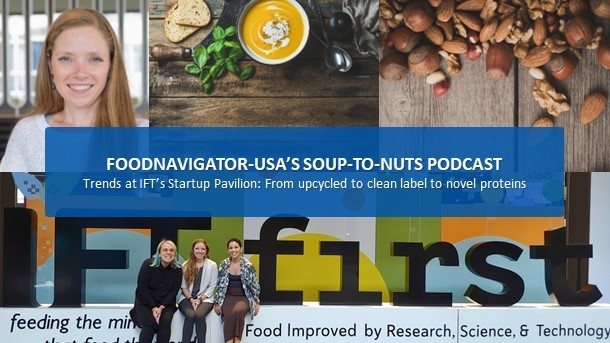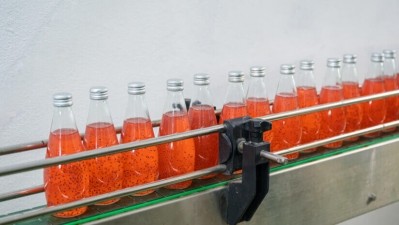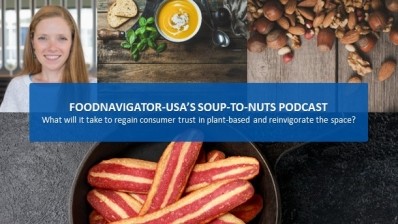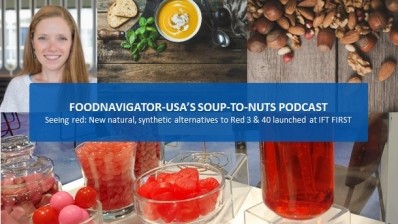IFT FIRST 2024
Soup-To-Nuts Podcast: Trends at IFT’s Startup Pavilion include upcycled ingredients, clean label preservatives, novel proteins and more

Innovations included novel proteins, upcycling would-be wasted food or by-products into clean label or nutrient-dense ingredients with reduced environmental impact, ingredients and technologies that promised to improve nutrition outcomes by slashing sodium, saturated fat, sugar and other nutrients of concern, or products that promoted consumption of naturally nutrient-dense vegetables.
In this episode of FoodNavigator-USA’s Soup-To-Nuts Podcast, we explore some of the solutions on display, including novel proteins from NuCicer, Superbrewed Food, The Protein Brewery, Onego Bio and Terra Bioindustries, upcycled clean label ingredients from Bioveritas, Phusis Bio and Paragon Pure, and other technologies and products that promote improved nutrition outcomes.
[Editor’s note: Never miss an episode of FoodNavigator-USA’s Soup-To-Nuts Podcast or our recently launched Founders’ Fundamentals Podcast – subscribe today.]
‘This is the fun part of the show’
As a relatively recent addition to the IFT FIRST event, the fast-growing Startup Pavilion is one of the top-visited areas at the annual event and expo. IFT reports that last year nearly 9,000 visitors browsed the space, which featured 86 startups.
This year, the pavilion included 100 startups and welcomed a steady flow of guests seeking new ingredients, novel technologies, investment opportunities and what is next in the future of food, according to Paavo Salminen, the chief business development officer at Onego Bio, which showcased in the pavilion its egg protein made via precision fermentation.
“What I love [in the Startup Pavilion] is that these guys have done a phenomenal job of spacing where we have … the space to talk to our clients and everybody who is coming in. And, the whole energy in this area – clients have been saying that this is the fun part of the show. So, everybody is coming here for inspiration. Everybody is coming here [to see] what the future will bring,” Salminen said.
Ruby Nicholson, the marketing and business development manager at BioVeritas, which makes clean label ingredients from upcycled ingredients, agrees that the Startup Pavilion at IFT FIRST is a hub for innovation, discovery and collaboration that is made possible in part because IFT keeps costs down for participating startups.
“What we love about IFT is that it is very innovation forward, and there are lots of people in the food space asking questions that maybe we have not even considered before. And, so it is attracting those people to begin with, and then on top of that there is this innovation space, where it is attracting startups like us, and really making the costs to enter pretty low,” she said.
She added the Startup Pavilion is a magnet for “really intelligent people coming into the space and then people with solutions and figuring out how we can partner.”
Startups feature clean label solutions, many from upcycled sources
BioVeritas is one of several startups in the pavilion showcasing clean-label ingredients made via upcycling that are touted as just as effective as – and often more sustainable than – their traditionally used synthetic alternatives.
Nicholson explains that BioVeritas created a clean-label mold inhibitor that is a one-to-one replacement for the petrochemical synthetic incumbent – calcium propionate – in the bakery space.
“A lot of the clean label alternatives on the market … are trading off things – trading off efficacy, sensory, things along those lines. But what we are able to do is we are able to deliver on the same efficacy, the same sensory as calcium propionate, but it is bio-based and gets to carry a clean label name because of that. So, it really is the best of both worlds,” she explained.
The company is still working out the exact term to use on labels as it pursues self-affirmed GRAS status and looks for partners in the bakery space to help it scale.
Another startup in the pavilion at IFT making clean label preservatives was PhusisBio, which the company’s head of commercial Melissa Torok explains uses a proprietary fermentation platform to isolate and efficiently and cost-effectively produce larger volumes microbes found in limited amounts in nature that can extend shelf life three to four times.
Because of the process it uses to create its powdered metabolite, the ingredient is listed simply as cultured sugar or cultured dextrose, which Torok says “has been used for years.”
But, she adds, the difference between PhusisBio’s cultured dextrose and others on the market that come from cultivated flour is that it is mostly an active ingredient, whereas others are predominately inactive ingredients.
“So, when you use our product, you use a lot less of it and there is no off flavor,” she said. This can result in in-use cost savings, even though on a pound for pound basis the ingredient is more expensive that competing products.
Startup Paragon Pure also leverages upcycling to create a range of better-for-you ingredients from would-be wasted rice bran. Kelly Marks, the culinary applications manager with the company, explains Paragon Pure’s two main products can help reduce saturated fat and sugar in final products without negatively impacting taste or texture.
The first is a rice bran butter, which comes from upcycled bran that is removed to create white rice, and which contains about 10% oils that are typically wasted. Paragon Pure turned those oils into a solid structure fat that is more environmentally sustainable and lower in saturated fat than tropical oils like palm or coconut.
The company’s second product – Sprouted by Nature – is a brown rice flour that is made from whole grain rice that is precision sprouted and then mashed, similar to brewing beer, and finally spray dried to crate a powder that is highly soluble and can be used to reduce sugar or act as the bulking agent in spreads when sugar is reduced. It also plays well in gummies, beverages and seasoning packets, she said.
Canadian startup Terra Bioindustries’ Chief Marketing Officer Rebecca Palmer explained to FoodNavigator-USA at IFT FIRST that sourcing upcycled ingredients can also help companies reach their sustainability goals and potentially lower their costs.
For example, Terra Bioindustries upcycles spent grains, like malt barley from beer or corn from bioethanol, into two ingredients at the same time – a syrup like a malt extract that is a “bit more price competitive” and a protein concentrate. Because it makes both simultaneously, production costs are lower and it can offer the ingredients at competitive price point.
Palmer adds that Terra Bioindustries’ upcycled protein stands out from more traditional soy and pea options because it contains the fiber, which allows it to be used in applications in which pea and soy traditionally struggle.
Novel proteins from plants, fungus and ‘neither’
Upcycling was not the only way that startups at IFT offered more sustainable nutrition, several companies also leveraged technology to offer high-protein ingredients from plants and fungus.
For example, NuCicer offers a range of high-protein ingredients sourced from chickpeas – but as CEO Kathryn Cook explains the company does not use the average chickpea that is found in the grocery store. Rather, it breeds chickpeas that she says are “way better” nutritionally, functionally and environmentally.
Cook explains that NuCicer has dramatically shorted the breeding process, which typically takes ten to 15 years, to about two or three years not by using genetic modification, but rather by tapping into predictive models and algorithms to identify which “parents” from its library of plants to cross pollinate and the using a “speed breeding facility,” or greenhouse with a highly controlled environment.
The first trait that NuCicer bred for was protein, so that it could offer an ingredient that is price competitive against a yellow pea. But it also is breeding for traits to improve crop yield, disease tolerance and a shorter growing season to “up value for the grower,” she said.
Two other startups at IFT are using fermentation to create proteins that are neither animal nor plant.
The first, Superbrewed Food, is using an anaerobic fermentation process and microflora native to the human microbiome to create what it calls a “postbiotic cultured protein,” which the company’s Chief of Commercial Julie Post-Smith says is more than 85% protein and has a high content of essential and branched-chain amino acid. She adds that because it is a whole food ingredient as opposed to a protein isolate, it also contains beneficial minerals and vitamins that help deliver nutrition beyond protein, as well as additional functional benefits – allowing for “lots of creativity in the kitchen” and potentially unexpected applications, like baked goods, beverages and cream sauces.
Earlier this year, Superbrewed Food received a “no questions” letter from FDA regarding its determination that its Postbiotic Cultured Protein and it is pursuing regulatory approval in the European Union, Great Britain and Canada, which will help expand its market potential in the coming years.
Another startup in the pavilion at IFT that uses fermentation techniques to make proteins is The Protein Brewery, but as the company’s commercial director Sam Claes said it uses an isolated fungal strain to create its Fermotein single cell protein.
These are just a few of the solutions found in the Startup Pavilion at IFT FIRST this year – but if you are interested in learning more about the innovations showcased in the pavilion or across the wider show floor, be sure to check out FoodNavigator-USA’s ongoing coverage from the conference over the coming weeks and check out our upcoming special edition with highlights from the show that will go out Aug. 8.

















